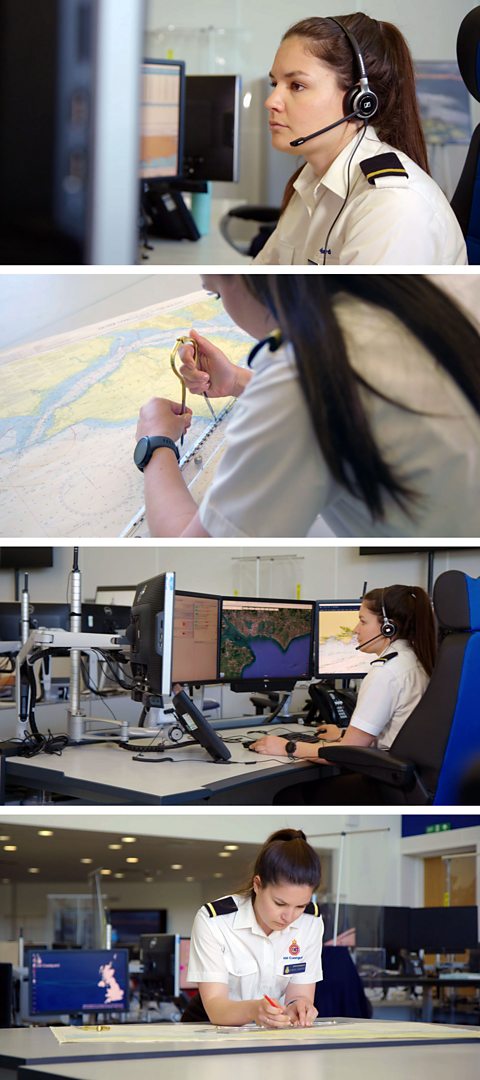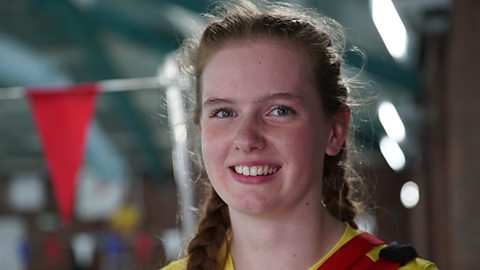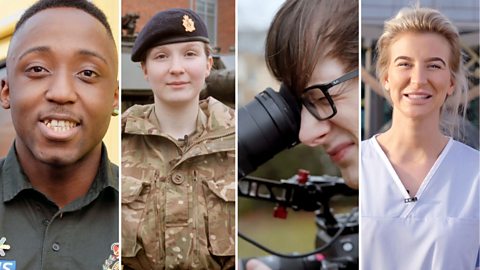Meet Sydney and find out about her role working for His Majesty's Coastguard. Part of our Bitesize world of work series.
SYDNEY: My name's Sydney and I'm a maritime operations officer.
A typical shift as a maritime operations officer will either start at seven in the morning or seven at night and we'll do a twelve-hour shift. And we could take 999 calls, we could take calls on the radio from people that need assistance at sea. We'll then come up with a plan about what we're gonna do and we'll send out different assets, like lifeboats, coastguard teams, helicopters, and speak to other emergency services as well.
My favourite part of the role is doing an incident from start to finish, where you take the initial call where someone needs some help at sea or on the coastline, and you keep updating the casualty along the way, and then you find out at the end that they've been rescued, and they're always really grateful for it as well which is really nice.
So I studied GCSEs at school and then I went on to do A-levels. I did them in History, Computing, Filmmaking, and I did a BTEC in Music Technology as well. And then I went to university and studied Film Production and got my degree. I also worked on the beach as an RNLI beach lifeguard, and I used to listen in on the radio, and I thought that would be a really exciting career.
I wasn't really sure what I wanted to do after university, as I didn't want to do film production. And then when I was working on the beach I always wanted to do the coastguard role.
Here at the coastguard we do all different training courses before we qualify. So we do training in chart work, we do training in vessel traffic monitoring, we do communications training, search planning training, and all sorts of other different training as well. So you do learn everything at work on the job.
My one piece of advice for someone that wants a job like mine would be to have a genuine interest in helping others. And working in this kind of environment that's fast-paced and under pressure. You need to be able to work really well as a team. You also need to be really good at talking on the phone. We speak a lot to different life boats and coastguard teams.
This job is really important because we're the first step in getting people help when they need assistance. And it makes me feel proud that we get to have such an important role in saving people's lives.
Here at the Coastguard we do training before we qualify… you learn on the job so it doesn’t matter if you’re not from a maritime background.

- Sydney responds to 999 and mayday calls from people in distress at sea
- A typical day involves communicating with lots of different people, including members of the public, the RNLI (Royal National Lifeboat Institution) and independent lifeboats, the National Coastwatch Institution, and vessels at sea, co-ordinating responses to help people in need
- As a student, Sydney worked as a RNLI lifeguard at the beach during the summers. In this role, she listened to the Coastguard over the team radio and thought it would be an interesting career, but she was worried about her lack of maritime knowledge
- After seeing an online job advert, Sydney realised that prior maritime knowledge wasn’t a requirement for the maritime operations officer role. When she started the job, there was lots of training offered
- At GCSE, Sydney didn’t really enjoy Maths as she couldn’t see how she'd use what she was learning in real life. Now, she's grateful that she learnt those maths skills as she uses them every day, when doing chart work, calculations and working out tidal patterns. Her ICT skills from school are also useful, as she monitors up to five screens at a time
- Summer's the busiest time of the year, with an increase in calls from members of the public in difficulty at the beach and on the coast
- Sydney’s favourite part of the job is seeing an operation through from start to finish, from taking the initial distress call to finding out the person has been safely rescued.


Maritime operations officers (MOOs) work for His Majesty's Coastguard, which is part of the Maritime and Coastguard Agency (MCA).
What to expect if you want to be a maritime operations officer
- Maritime operations officer average salary: £23,847 + allowances
- Maritime operations officer typical working hours: On average the shift pattern equates to 37 duty hours per week over a 12-month period. It could include evenings, bank holidays and weekends.
What qualifications do you need to be coastguard?
No formal qualifications are required to become a Maritime Operations Officer. All you need is a passion for helping others, to be IT literate and have a good standard of Math and Literacy. To be successful, you will need to complete literacy, numeracy and IT skills tests. Maritime experience is not essential, but you will have to have reached your 18th birthday before you can start in role (to comply with the shift working requirement). Maritime and Coastguard Agency roles are advertised on the Civil Service Jobs site.
Career Progression
Once you’ve started your career as a Maritime Operations Officer, and following 12-18 months of on-the-job training, you will gain your maritime operations officer qualification. At this point, you may want to progress your career by moving to a senior maritime operations officer role and then to team leader. Alternatively, you could explore other opportunities within the Maritime and Coastguard Agency.
Source: The Maritime and Coastguard Agency.
This information is a guide and is constantly changing. Please check the Maritime and Coastguard Agency (MCA) site and the Civil Service Jobs site for the latest information and vacancies.
For careers advice in all parts of the UK visit: National Careers Service (England), nidirect (Northern Ireland), My World of Work (Scotland) and Careers Wales (Wales).

Jobs that give back: My frontline career. video
Hear from four young people – a firefighter, nurse, police sergeant and coastguard – who are helping others via their frontline careers.

Lucia: lifeguard
Lucia completed her lifeguard training when she was 16 and now works at a local swimming pool.

More from Bitesize Careers
Hear from young people about the world of work.
